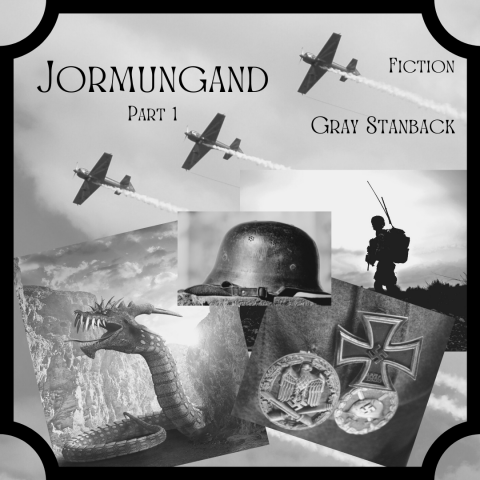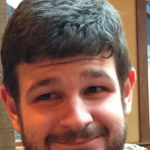Jormungand, Part 1

Image created onCanva
“The third lucky bastard, he went over Nuremberg,
up came the flak like a Christmas tree!
And the rear gunner sang, as he reached for his parachute. . .
who’ll come on ops in a Wimpy with me?”
The raucous singing that filled the Badger Arms pub rang in Colin Pembroke’s ears, as if an orchestra was playing in his head. He regarded it with a mixture of amusement and annoyance; bomber crews had a cult-like feel about them that, for whatever reason, he just couldn’t seem to comprehend.
Grumbling to himself, Pembroke returned to his beer. The Badger Arms was a fairly low-class place, and its drinks were no exception. At best, they always had a faint aftertaste that was somewhere between dirty toilet water and the kind of piss-flavored swill that might pass for beer in America.
While all of that might have been annoying to Colin Pembroke on his off days, it meant absolutely nothing to Colin Pembroke, agent of the Special Operations Executive. The SOE — “Churchill’s Secret Army”, people called them—was every bit as important to the war effort as the Royal Air Force, but as far as the public were concerned, they barely existed.
The boys at Bomber Command got to paint little kill-marks on the sides of their planes, the really successful ones got treated like star athletes, but he didn’t so much as make the Daily Mail.
Pembroke wasn’t here for drinks. He was at the Badger Arms because he had a meet with someone very important— someone who, according to the clock, would be arriving in less than two minutes. The rowdy crowd of RAF pilots had already left, and Pembroke was the only customer inside.
“Slow night?” he asked the bartender.
“I guess you could say that,” the bartender said.
“I’ve had a rough couple of weeks, and honestly I just want to unwind.” He chose his words so he wouldn’t give away the real reason he was at the Badger Arms.
“It’s been rough for all of us,” said the bartender. “I just hope it’s been even rougher for the Krauts.”
Pembroke wanted to laugh, but something subconsciously stopped him. Before he could identify what it was, a voice spoke behind him. “Colin Pembroke,” it said, in a tone that seemed both stern and condescending. “Your presence is requested at once. Come with me.” Pembroke spun around on his barstool.
The speaker was a tall man with steel-gray hair, a large dark mustache, and a severe-looking expression that reminded Pembroke of some kind of predatory bird. He stared at both Pembroke and the bartender for a few seconds, not saying anything.
John Keller, Pembroke thought to himself, recognizing the visitor. If they sent him, this had better be really bloody important.
“Keller,” said Pembroke. “I was waiting for you.”
“Do not speak until spoken to,” responded Keller. “You will receive a full briefing on your task once we are in a safer location. We may be alone here, but there is still a chance someone might overhear us.” Pembroke nodded.
Outside the Badger Arms sat a black Rolls-Royce, its paint gleaming like the surface of a clear pond at midnight. Keller gestured again for Pembroke to get inside. The windows of the car were tinted, so he had no way of knowing where they were going, or what his plans were. As a member of the SOE, however, it was rather obvious that he had been recruited for yet another spying mission.
After what seemed like hours of driving, the Rolls-Royce came to a stop. He had left the Badger Arms in the late afternoon, but it was now well after dark. The car was parked on an airfield, on which a dozen or so airplanes sat. Most of them were twin-engine bombers— Armstrong Whitworth Whitleys, Vickers Wellingtons, and the like. There were also a few Handley Page Halifaxes and Shorts Stirlings, big four-engine bombers that had been withdrawn from combat duty.
However, rather than leading him towards the airplanes, Keller directed Pembroke towards a small building on the outskirts of the tarmac. To his great relief, the building was brightly lit inside, and he sat down at a table while Keller pulled down a projection screen.
The projection screen switched to show a grainy, black-and-white photograph of a cluster of buildings next to a river, which Pembroke recognized immediately as the Rhine.
“These photos, taken by one of our Mosquito photo-reconnaissance aircraft, depict a research facility of unknown purpose alongside the occupied area of the Rhine River,” said Keller. “Although we currently have no way of infiltrating this facility, it must be taken offline before we begin our assault on the Rhine. Do you accept this mission?”
Pembroke said nothing, and only nodded.
“Good,” said Keller. “Then you will need to change.” He motioned towards a set of clothing on a nearby table, and Pembroke realized it was a German Wehrmacht uniform. Pembroke wanted to question why he was being forced to wear this, but he recalled Keller’s words and held his tongue. Keller spoke again.
“We have received limited intelligence regarding this particular target,” Keller said, “but what we do know is that there are likely to be armed German personnel stationed there in large numbers. Therefore, for the purpose of this mission, you will be assuming the persona of a German bomber pilot named Joachim Dieter.”
Keller opened a large crate, and produced a brown uniform with an emblem of an eagle clutching a swastika on the shoulder. A Luftwaffe uniform, Pembroke immediately reminded himself. Whether it was a genuine Nazi uniform that had been stolen, or a very precise replica, he had no way of knowing, but he wasn’t about to question that. Instead, he simply nodded as he changed out of his civilian clothes and into the enemy uniform.
Once he had done so, Keller handed him a sheet of paper.
“This is your new identity,” Keller said. The sheet of paper was the biography of a Luftwaffe pilot, specifically that of a Heinkel He 111 bomber. According to the backstory given, he was to claim that his bomber had been damaged by flak over London, and he’dad been forced to bail out while returning to Germany. Like all SOE agents Keller had been educated in speaking German, though he privately doubted that it would be enough to fool anyone.
Once the orientation was finished, Keller led Pembroke outside to the nearest of the airplanes parked on the tarmac. A Vickers Wellington, Pembroke thought. The so-called ‘Wimpy’— as in J. Wellington Wimpy, the guy from the Popeye cartoons. The plane was painted entirely black, save for the Royal Air Force insignia on its sides, wings, and tail— it lacked even a serial number.
The nickname Vulture’s Delight was scrawled across the nose in green paint, no doubt in violation of some RAF code regarding special-ops planes.
“Get in,” said Keller, handing Pembroke a heavy fabric pouch and strapping it onto his back. Pembroke didn’t bother asking what it was, but the feel of the pouch in his hands told him it was a parachute. “And take this.”
Keller thrust a small, black pistol into Pembroke’s hands. “It’s tiny. Only holds five bullets. But it’s got a silencer on it, so the Krauts won’t hear you until they’re dead. Latest offering from the boffins up in the Frythe. They call it the Welrod.”
Pembroke placed the pistol in his holster, and boarded the plane without a further word. The interior of the Wellington was, for lack of a better word, spartan. The bomb bay had been removed and replaced with wooden seats. As he sat down, the pilot— a clean-shaven man slightly younger than himself, whose name tag said Captain Edward Kerry— flashed him a thumbs-up before starting the engines and pulling back on the throttle.
The Vulture’s Delight gave a lurch, and Pembroke felt his back hit the hard wooden seat as it accelerated down the runway and rose into the air. The plane’s landing gear retracted with a distinctive k’chunk sound. As the plane leveled off in flight, Pembroke began to doze off, the only sounds in his ears the rumble of the Wellington’s engines and the crew singing to one another.
“. . . Ops in a Wimpy, ops in a Wimpy,
Who’ll come on ops in a Wimpy with me?”
When Pembroke woke, it was to the smell of burning fuel. Staring out the window, he could see that the Vulture’s Delight’s starboard engine was engulfed in flames. “The hell’s going on?” Pembroke shouted towards the cockpit.
“No bloody idea,” Kerry said. “The engine just flamed out. Everything looked fine before we took off, so I don’t know why it would do that. I should still be able to make it back to base on just one engine, but it’ll be a close call.”
“Flak? Night-fighter?” Pembroke asked.
“Doubtful,” said Kerry. “If Jerry wanted to kill us, he wouldn’t have done such a piss-poor job.”
The Vulture’s Delight suddenly pitched downward violently, and Pembroke felt himself thrown forward in his seat. “Change of plans!” Kerry shouted,“we’ve got to bail out! Bloody controls aren’t working!”
As Pembroke threw open the door of the Wellington, a blast of cold air struck him in the face with the force of a solid object. Strapping his parachute onto his back, he leaped out of the plane and felt the wind ripping at his clothes as he dropped away from the flaming airplane. “Kerry!” he shouted. “Jump, damn you!”
By this point Pembroke was too far below the plane for Kerry, or anyone else on board, to hear him. As he pulled the ripcord and deployed his parachute, his field of vision was filled by a massive, flaming hulk, as the wreckage of the Vulture’s Delight came plummeting out of the sky like a dead bird.
For a split second, though, he thought he could see something else, silhouetted against the flames and the pitch-black night sky. Something moving, wings like a huge black bat. . . it almost looked alive.
Pembroke shook his head, snapping himself back to reality. He was less than three hundred feet above ground now, and he guided his descent onto a grassy hilltop. The force of a parachute landing always surprised him— it felt like making a long-jump. Dusting himself off, Pembroke unclipped his parachute and looked around to make sure he was alone.
He was not.
Although he couldn’t clearly see the two soldiers approaching him, Pembroke could tell that they were German. Reflexively, he reached for his gun, but stopped himself. The more he found out from them, the better.
“Who are you? What are you doing here?” one of the soldiers asked, in German.
Pembroke paused. He had been assigned a false identity by Keller, and now was the time to use it. “Joachim Dieter. Luftwaffe Oberleutnant. And I might ask the same of you two.”
“We do not know of any Oberleutnant Dieter stationed near here,” said the first soldier. Pembroke felt his heart beating faster, anxious that his ruse was about to crack before he could even set it up in the first place.
“I am not stationed near here,” Pembroke said at last. “I was stationed near Dusseldorf. My bomber developed engine trouble while returning from a flight over Britain, and I was forced to bail out. I was the only survivor. I tried my best to make time for the other crew members to escape, but the flames gave them no chance.”
The second German soldier sighed. “Very tragic indeed.” He walked closer to Pembroke, so that he could see the name written on his uniform tag— Oberst Hans Zimmerman.
Zimmerman placed his hand on Pembroke’s shoulder, and Pembroke fought even harder against the instinct to reach for his gun and kill him. “You were a very brave man,” Zimmerman said.
Pembroke recoiled. A bloody Kraut just paid me a compliment. What the hell is happening to me?
Zimmerman motioned with his hand for his companion to step back, and resumed speaking to Pembroke. “We like brave men. I will see to it that you are returned to your base and recognized for your courage.”
Pembroke felt his heart drop into his stomach. If they returned him to his base, they would find out that there was no Oberleutnant Joachim Dieter, that no Heinkel He 111 bomber had crashed that night, and most importantly, that he was a British spy. He had only one card left to play, and as his luck would have it, it was the four of diamonds– great if you needed a flush, but otherwise it was just the four of bloody diamonds.
“I have one question before you do anything.” Pembroke said.
“What is it?” asked Zimmerman, with an irritated tone to his voice that put Pembroke on edge.
“When my bomber’s engine caught fire, I thought I saw something in the smoke,” Pembroke said. “I couldn’t see it clearly, but it looked like some sort of huge animal. It had wings, but it wasn’t a bird— they looked more like bat wings. I saw it for a few seconds, and then it disappeared.”
Zimmerman, at first, said nothing. A moment later, he walked away from Pembroke and spoke to his companion, whispering so that Pembroke was unable to hear him. There was another moment of silence, and Zimmerman turned to Pembroke.
“You saw something very sensitive. Something you were not supposed to see,” Zimmerman said.
“Am I in any sort of trouble?” Pembroke asked.
“No,” said Zimmerman. “It was not something you, or anyone, could have avoided. But we cannot have you tell this story publicly. We cannot have you returned to your base as we planned. Now, you stay here. If you try to leave, you will be arrested, and quite possibly killed.”
Zimmerman’s companion, whose name Pembroke could now see was Generalmajor Wilhelm Dittmar, pointed his rifle at Pembroke, and Zimmerman did likewise. “You have my complete cooperation,” said Pembroke. “I will do whatever you tell me.”
Dittmar and Zimmerman looked at each other, and lowered their guns. “Very well.”
To be continued…
Read Part 2 & Part 3.
Need more fiction? Check out these other stories on the MockingOwl Roost.

Gray Stanback
Gray Stanback was diagnosed with autism at the age of three, and ever since has been fascinated by storytelling. Some favorite authors include Stephen King, H. G. Wells, and Japanese manga writer Mohiro Kitoh. Gray graduated Guilford College in 2016 with a major in biology and a minor in environmental studies. He has been writing original works of science fiction, fantasy, and horror since middle school.
Follow Gray on his website.





7 Comments
[…] Part 1, Part 2 & Part […]
[…] Part 1, Part 2, & Part […]
[…] – Part 1, Part 2 & Part 3 – Historical fantasy […]
[…] Read Part 1 on a previous blog post. […]
[…] Read Part 1 on a previous blog post. […]
[…] Jormungand – Part 1, Part 2, & Part 3 […]
[…] Part 1, Part 2 & Part 3 – Science […]